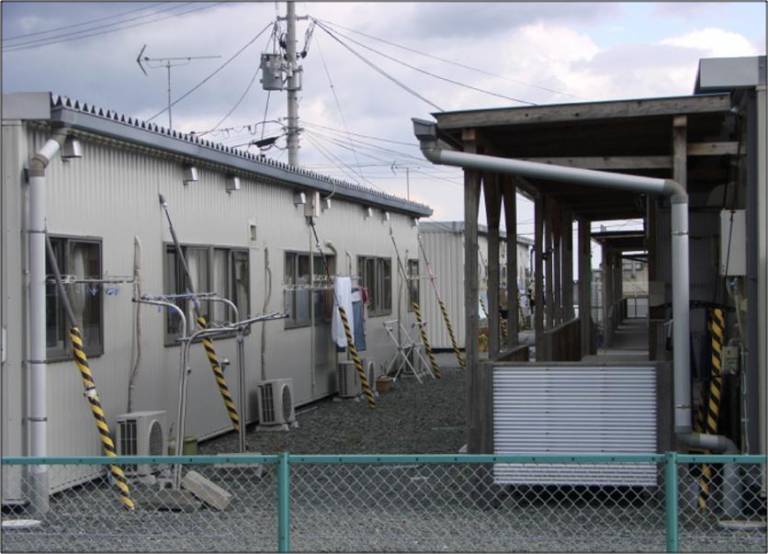IRDR MSc student alumni publishes paper on Early Warning and Temporary Housing based on his MSc project
5 June 2018
A collaboration between UCL-IRDR and IRIDeS-Tohoku University Angus Naylor, an IRDR Masters student alumni and Masters Prize Winner, has published the research conducted for his Independent Research Project in the International Journal of Disaster Risk Reduction.
 The research was carried out as part of his MSc Risk, Disaster and Resilience and formed part of UCL IRDR's ongoing collaboration with Tohoku University IRIDeS (International Research Institute of Disaster Science).
The research was carried out as part of his MSc Risk, Disaster and Resilience and formed part of UCL IRDR's ongoing collaboration with Tohoku University IRIDeS (International Research Institute of Disaster Science).
An example of Temporary Housing following the Great East Japan Earthquake and Tsunami visited during the fieldwork for this study (Photograph source: Dr Joanna Faure Walker)
The study focussed on elderly residents living in temporary housing complexes in Miyagi and Iwate. The residents were visited by a joint IRDR-IRIDeS field team led by Dr Joanna Faure Walker and organised by Dr Anawat Suppasri three and a half years after the 2011 Great East Japan Earthquake and Tsunami. No one method of warning reached the majority of respondents, demonstrating the need for multiple forms of early warning system alerts. Only half the respondents had prior knowledge of evacuation plans with few attending evacuation drills and there was a general lack of knowledge regarding shelter plans following a disaster. Age of the residents played a significant role regarding what was known before the warning was received, whether action was taken and how temporary and permanent housing was viewed. However, it was not the principal factor affecting whether an early warning was received. Concerns raised among the elderly in temporary housing echoed the complaints from 16 years earlier following the 1995 Kobe Earthquake: solitary living, too small, not enough heating or sound insulation and a lack of privacy.In order to increase resilience against future disasters, we need to consider the elderly and other vulnerable groups within the entire Early Warning System process from education to evacuation and for temporary housing in the transitional phase of recovery.
UCL-IRDR and IRIDeS have existing joint publications on subjects such as understanding stress changes for earthquake hazard (Mildon et al., 2016) and fatality ratios following tsunami (Suppasri et al., 2016). IRIDeS has further joint publications with UCL-EPICentre on tsunami engineering. In October 2018, there will be a signing ceremony between UCL and Tohoku University and UCL-IRDR and Tohoku University IRIDeS will meet for their next symposium on disaster risk reduction.
Access article:Naylor et al., 2018
More details can be found in the IRDR Blog article
 Close
Close






